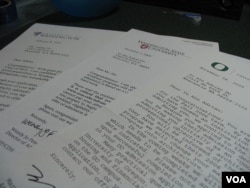“I want to study in US college but I do not know how,” wrote Mohamed on our Facebook page. “Before starting the process, I was really nervous and most of the things were confusing,” said Farima in her most recent blog post about applying to college.
There are many steps and many things to think about, and this month our bloggers have discussed how they overcame each of the challenges of applying. And they did overcome them. Farima added:
[Read Farima’s full post on applying to college]
First steps
EducationUSA breaks the preparation process into five steps, which makes the whole thing a bit more manageable. The steps start from when you decide to pursue an education in the US and end at preparing to actually depart, and the very first step is researching schools.
[Read our post on first steps and breaking down the process]
There are many tools out there to help you research schools – websites, live webchats, and college fairs to name a few. But the key to effective research is to figure out what you want out of a school or program (oh, and to make sure you fit the requirements of the programs you want).
For Jaime it was easy. She knew she wanted to go to journalism school so she “didn’t have to put too much thought into picking a university. I applied to all of the top journalism programs in the U.S. and then some back up schools.”
Tara focused a lot on location, picking schools in big cities that she felt represented the culture of America (she ended up in Los Angeles, the heart of Hollywood). Nick had a more difficult time, because he was using more criteria to make his decision:
[Get advice on exploring your financial aid options]
In the end, Nick chose to attend St. John’s College, a school he actually encountered “out of pure chance,” because one of his friends was applying.
[Read more about how our bloggers decided where to apply]
Components of an application
Unless you’re like Sadia, whose program placed her in a specific school, eventually you'll have to actually apply to the schools you research. Your application will typically consist of the application form itself (usually pretty straightforward and, especially for college, many schools will use the same or similar forms) and some supporting materials. Here’s what our bloggers have had to say on each component of a college application.
The personal statement
Letters of recommendation
What do you do once you’ve submitted your applications? Mostly, you just wait – and if you’re like our bloggers, waiting can be one of the hardest parts. “I just tried to stay positive and constantly remind myself that I had worked really hard to deserve it,” said Alex.
Watching your friends get their acceptance letters while you’re still waiting can be anxiety-inducing, according to Tara, who wrote in March that her friends back in China were having trouble staying calm as they waited to hear.
And if you’re like Farima and Jaime, even after you've received the letter, the anxiety's not over. Farima said that when she received her admissions letter from Hobart and William Smith, she was too nervous to open it and find out the result.
For Farima the letter brought good news, but Jaime got bad news from her top choice school, NYU:
[Read more about what it’s like to wait for your admissions decision]
But it worked out in the end for Jaime too. “I eventually got past being upset and realized that sometimes you just have to make the best of the situation at hand,” she said. “I’m not really the kind of person who believes in fate, but looking back I’m happy I ended up at Syracuse - a school that was definitely not my first choice.”
There are many steps and many things to think about, and this month our bloggers have discussed how they overcame each of the challenges of applying. And they did overcome them. Farima added:
You should not worry about what doesn’t make sense at first. You will learn everything; though one thing to have in mind is to be yourself.
[Read Farima’s full post on applying to college]
First steps
EducationUSA breaks the preparation process into five steps, which makes the whole thing a bit more manageable. The steps start from when you decide to pursue an education in the US and end at preparing to actually depart, and the very first step is researching schools.
[Read our post on first steps and breaking down the process]
There are many tools out there to help you research schools – websites, live webchats, and college fairs to name a few. But the key to effective research is to figure out what you want out of a school or program (oh, and to make sure you fit the requirements of the programs you want).
For Jaime it was easy. She knew she wanted to go to journalism school so she “didn’t have to put too much thought into picking a university. I applied to all of the top journalism programs in the U.S. and then some back up schools.”
Tara focused a lot on location, picking schools in big cities that she felt represented the culture of America (she ended up in Los Angeles, the heart of Hollywood). Nick had a more difficult time, because he was using more criteria to make his decision:
Selecting schools was probably the hardest part in my experience applying to U.S. colleges, simply because there are so many of them. This seemingly impossible process became a little more manageable as I prioritized my criteria in the search. I basically had two main criteria, namely the quality of the department to which I was applying and its financial aid program (or the availability of any scholarship program specifically for international students) ... I came up with a list of 10 colleges. I then placed them in different categories: safe schools, fit schools, reach schools, and dream schools by looking at their acceptance rates ...
[Get advice on exploring your financial aid options]
In the end, Nick chose to attend St. John’s College, a school he actually encountered “out of pure chance,” because one of his friends was applying.
[Read more about how our bloggers decided where to apply]
Components of an application
Unless you’re like Sadia, whose program placed her in a specific school, eventually you'll have to actually apply to the schools you research. Your application will typically consist of the application form itself (usually pretty straightforward and, especially for college, many schools will use the same or similar forms) and some supporting materials. Here’s what our bloggers have had to say on each component of a college application.
The personal statement
…writing an admissions essay is very different from any other essay you have ever written. When I first heard from my college counselor that “you should write an essay you have never written before, and explain yourself through a story of your life, rather than describing yourself with one word,” It didn’t make sense to me.
But after writing my own essay, I knew what she meant. After proofreading my essay, I could find a real me in there.
- Farima: From High School to College
I like to think that the personal statement is the most important part of the admissions packet, so I worked really hard to highlight my strong points and to elaborate on why the place where I was applying was suitable for my choice of career and academic interest.
But I tried to be concise as well, as I imagine those universities get thousands and thousands of applicants with only a handful of staff to sort through them. They all put word limits, as a matter of fact, so the choice of words had to be careful too.
- Nareg: I Am On My Way…To Graduate School
Standardized testsAfter a series of persistent negotiations, American University agreed to recognize my degree if I made up for the required credit hours, but the real challenge was the GRE examination.
I had to deal with an old antagonist: Mathematics! I had hated the subject most of my life, and here I was, solve for ‘x’ or forget about it. I had three months and three chances to pass the test before the application deadline.
On January 19, 2010, I took the test for the third time. I was nervous again, but this time I liked it, I knew I was on to something greater. Guess what, I passed the darn test. And a few months later, I got my acceptance letter from AU.
- Alex: Piece by Piece I Rise With the Times
[Find out more about which standardized tests you may be required to take]Letters of recommendation
People tend to be busy, so it is useful to remind your recommenders every once in a while to go on to that website and to submit that letter. I found a gentle reminder e-mail once every couple of weeks or so was enough. It is also a good idea to get an early start on your recommenders, so that they have the time to craft a meaningful letter.
I was fortunate in picking a couple of people at my college who I knew shared my interests and also with whom I had had helpful interactions over the past few years, including discussions on politics and international affairs. My third recommender was a mentor and internship boss of mine back in Armenia, so she had seen my “real life” work (as opposed to my academic work) and could speak to that.
- Nareg: I Am On My Way…To Graduate School
The waiting gameWhat do you do once you’ve submitted your applications? Mostly, you just wait – and if you’re like our bloggers, waiting can be one of the hardest parts. “I just tried to stay positive and constantly remind myself that I had worked really hard to deserve it,” said Alex.
Watching your friends get their acceptance letters while you’re still waiting can be anxiety-inducing, according to Tara, who wrote in March that her friends back in China were having trouble staying calm as they waited to hear.
And if you’re like Farima and Jaime, even after you've received the letter, the anxiety's not over. Farima said that when she received her admissions letter from Hobart and William Smith, she was too nervous to open it and find out the result.
For Farima the letter brought good news, but Jaime got bad news from her top choice school, NYU:
When I got home I ran to the kitchen to find the letter. Small envelope, like I expected. Unfortunately, the made for film idea that small envelopes are equivalent to rejection is actually pretty accurate. Of course, there are exceptions, but not in my case.
To this day I have not actually opened that letter. I held the envelope up to the light and read the words “We regret to inform you.” At the time I was devastated, of all the schools I applied to (and it was a lot) I was only accepted to three. I worked so hard and it seemed liked none of it paid off.
[Read more about what it’s like to wait for your admissions decision]
But it worked out in the end for Jaime too. “I eventually got past being upset and realized that sometimes you just have to make the best of the situation at hand,” she said. “I’m not really the kind of person who believes in fate, but looking back I’m happy I ended up at Syracuse - a school that was definitely not my first choice.”






